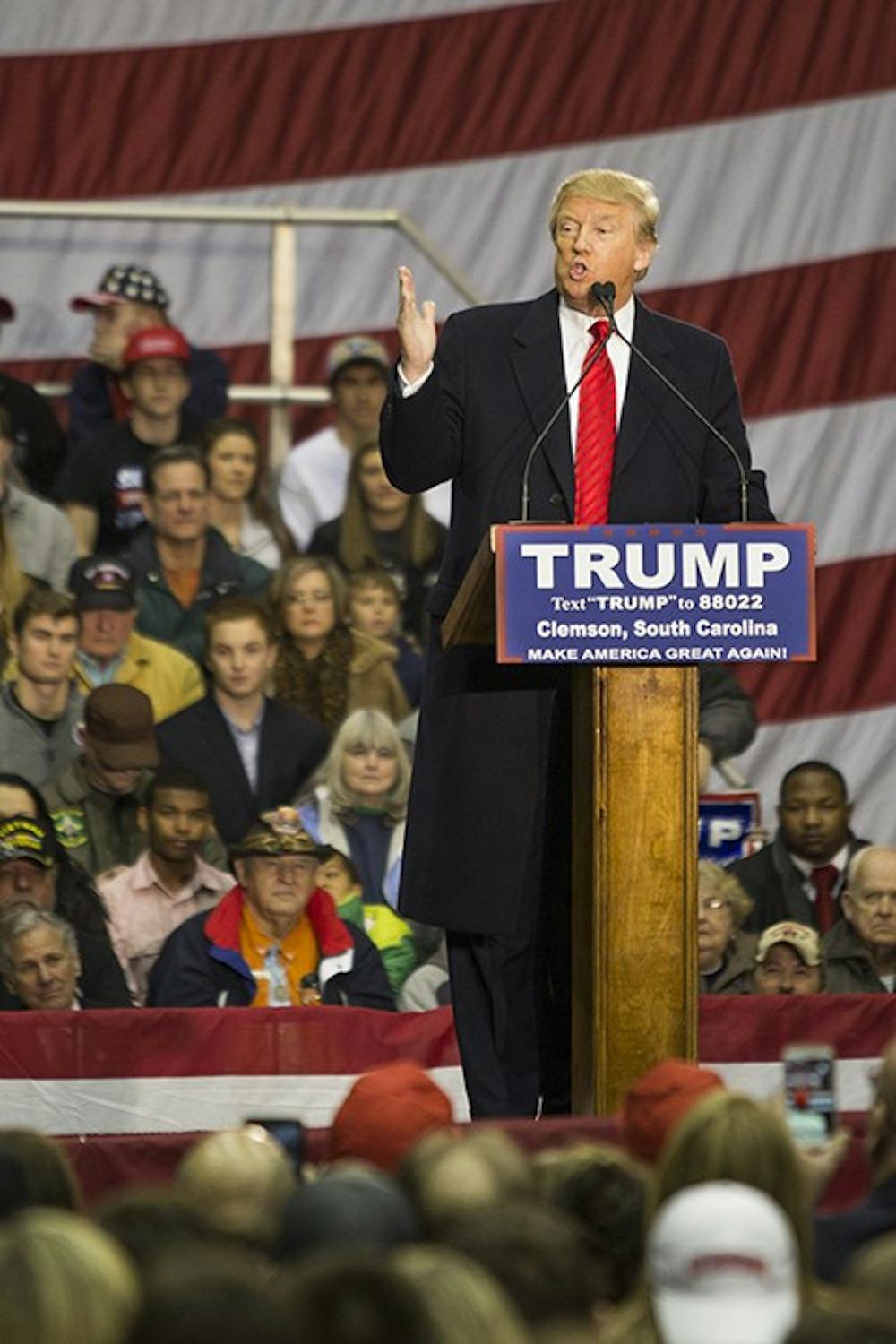Given the personality seen from 2016 presidential hopeful Donald Trump, it's unsurprising that his supporters are just as enthusiastic and raucous as he is. They turned up in full force to hear him review the highlights of his campaign at Clemson University's T. Ed Garrison Arena on Wednesday evening.
After a brief introduction from South Carolina Lt. Gov. Henry McMaster, Trump took the stage, accompanied by The Beatles' "Revolution." He began by discussing his recent win in the New Hampshire primary on Monday.
"The reason [we won] is that people are tired of losing in this country," he said. "We're losing all the time. People are tired of stupidity, incompetence — we're not going to have it anymore."
In between humorous digressions in which he complimented the audience or wondered at the size of the crowd, Trump reviewed his campaign success so far and reflected on his transition of focus from business to politics.
"I've been in politics all my life, but I've been ... a supporter," he said. "And one of the things we're doing and one of the things I'm doing is I'm self-funding my campaign, so I can't be bought."
From this, he segued into a criticism of competing Republican candidate Jeb Bush's campaign budget, which dramatically exceeds Trump's own and is disproportionate to his success so far. Trump said that he felt it was important to fund his campaign independently because he had been acquiring money all his life and felt this was the point to stop being greedy for it.
"I want to be greedy, but I want to be greedy for the United States. We want to bring money into the United States," he said. He plans to separate himself from the business he has built and transfer the responsibilities to his children and executives.
One of the biggest problems in the United States that Trump believes needs to be fixed is the debt, which increases regularly due to trade deficits with other countries. He warned against an impending economic crash to which the United States is vulnerable because it is so connected to foreign economies.
"We are sitting on a very dangerous bubble," he said. "We're so tied into China ... When they go bad, we go bad, and the whole thing is ridiculous."
He also discussed a phenomenon he called "corporate inversion," which is when companies native to the United States shut down their American manufacturers and move to other countries.
"Companies have ... closer to $5 trillion outside of this country," he said. "The companies can't get their money back in ... The Democrats ... agree and the Republicans agree: We are going to bring the money back. They can't get a deal done ... because we don't have a leader as a president."
According to Trump, the United States spends more per student on education than any other country, and yet the education system is ranked below some developing countries. He drew a parallel between Bush's high spending and lack of campaign success to that of the United States on education.
Another of his points was the negotiation of prices for prescription drugs. Currently, the United States does not negotiate, and Trump said that the people could save $300 billion if the government started doing so.
Trump blames politicians' lack of initiative on their reliance on money from companies. Career politicians often rely on money from outside sources, and therefore they have to abide by expectations of those sources.
"The politicians will never get you to the promised land," he said. "They're preservationists ... They're good at getting re-elected. They're great at getting money. They're great at getting all of this stuff, and they'll never help you."
As a solution to these economic challenges, Trump would start having more people from business backgrounds involved in policy-making. He would be stricter on American companies that try to move manufacturing plants out of the country and would work to reduce the exorbitant annual deficits the U.S. owes to other countries.
He also criticized foreign policy decisions such as the Iran nuclear deal and the way the administration handled Iran's recent capture and release of 10 American sailors, which was preceded by the publication of a video showing the sailors held at gunpoint.
"We're going to make our country so wonderful again, and you people can be so proud of our country again," he said. "We're not going to have deals where our sailors are put on their knees with their hands up."
Throughout the speech, the audiences responded to Trump's most characteristic quotes with excitement that filled the huge, vaulted ceilings of the rodeo arena. Just as bullfighters must carefully calculate their moves in the arena, so Trump and the other presidential candidates will have to in the political arena in the coming weeks and months.
For now, until the South Carolina Republican primary on Feb. 20, that arena will be South Carolina and the candidates will be fighting down to the very last vote.

